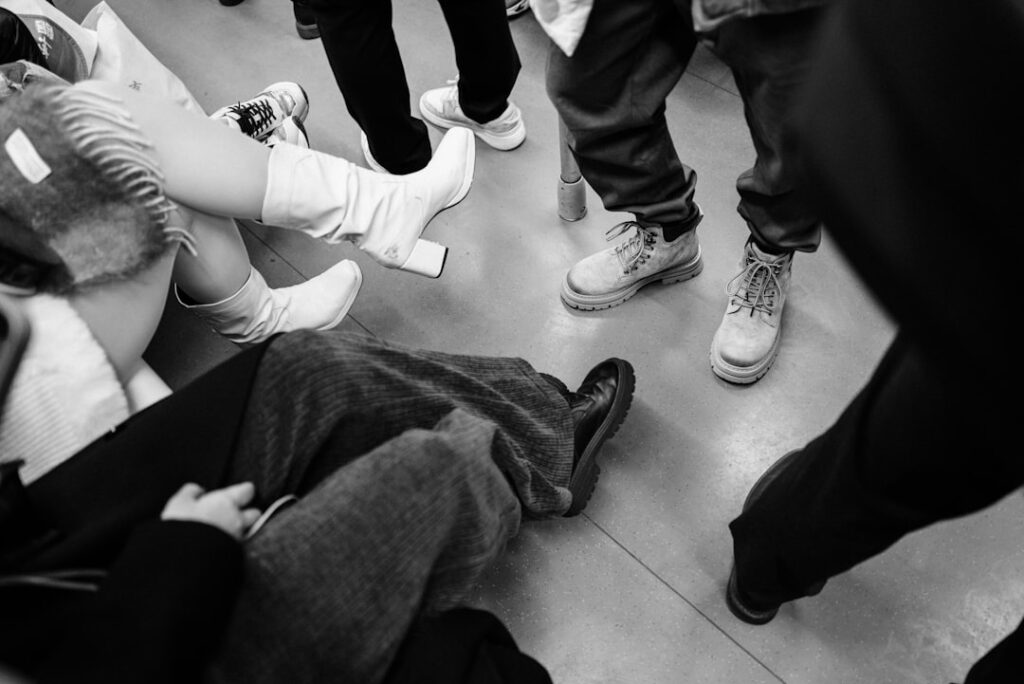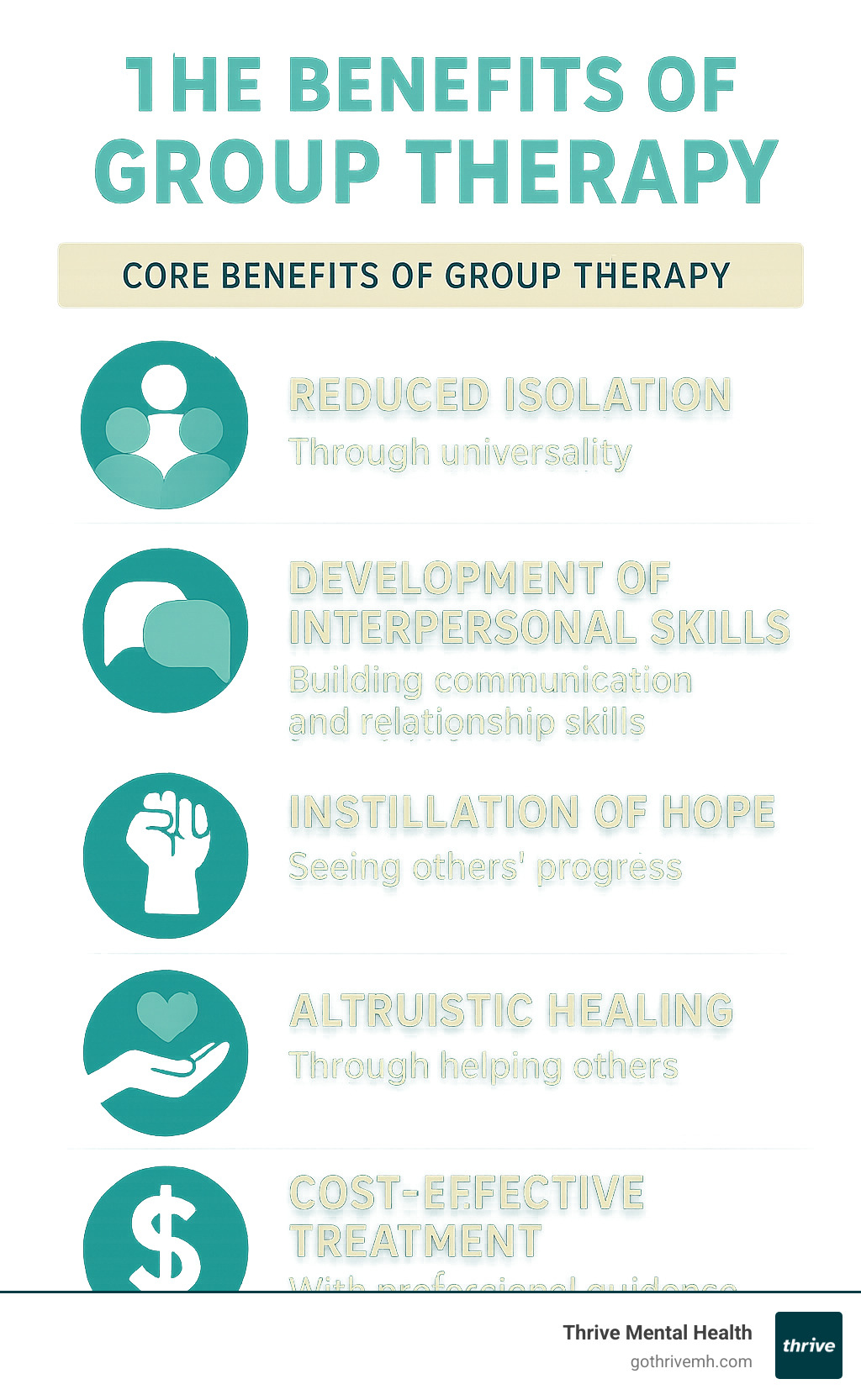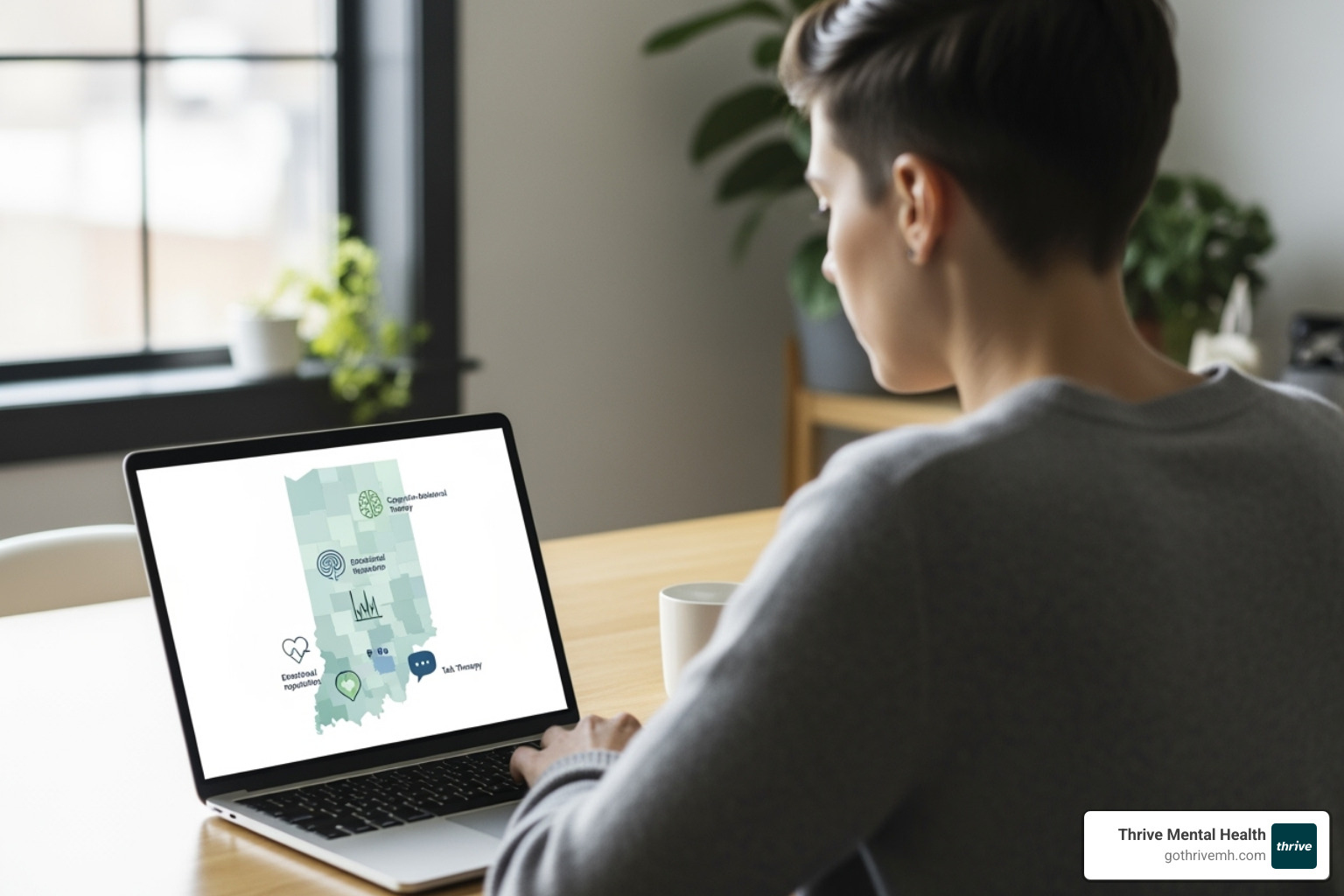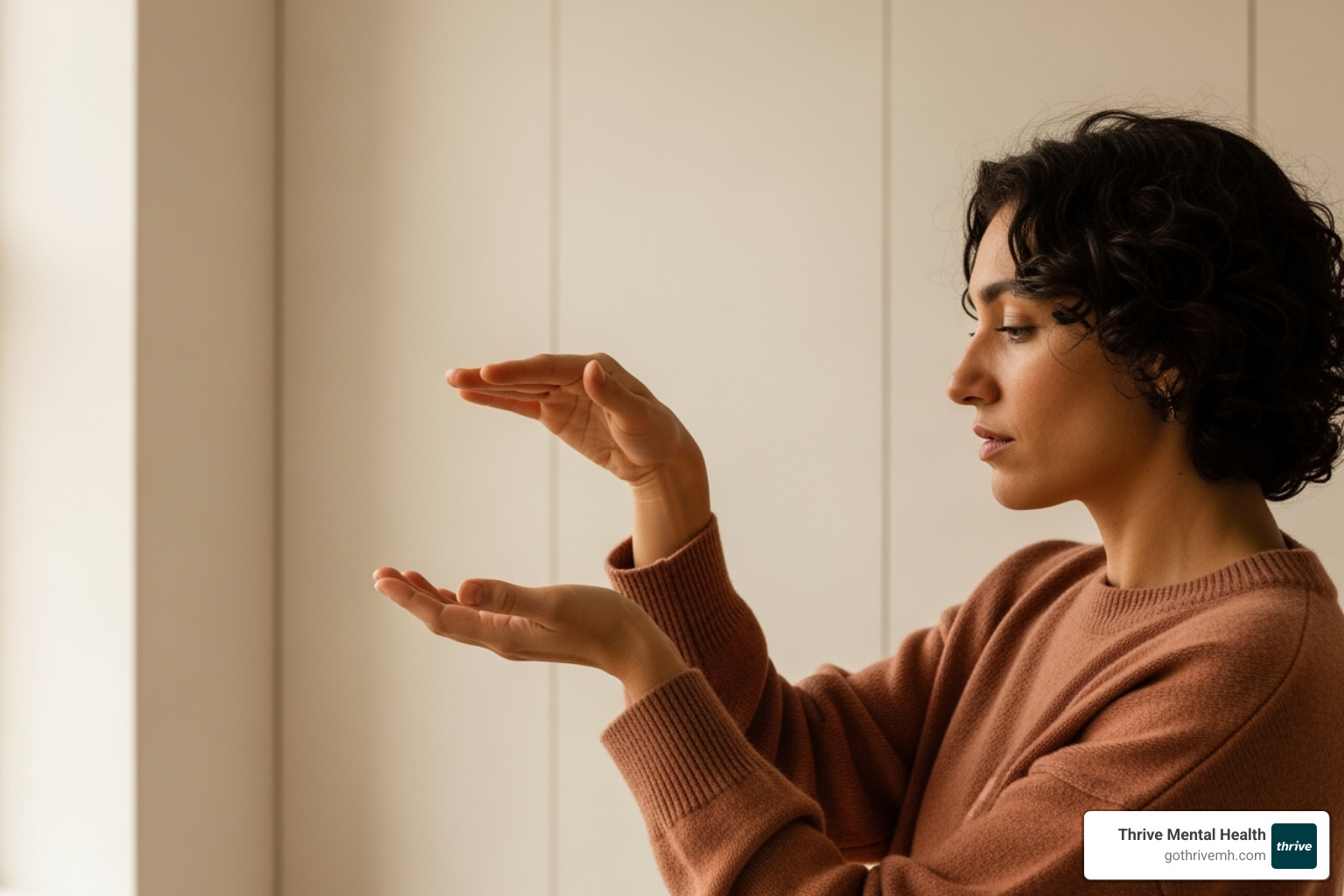Find Your Tribe with Group Therapy in Indiana

Why Group Therapy Offers Connection and Healing Across Indiana (and Beyond)
Struggling with anxiety, depression, or other mental health challenges can be an incredibly isolating experience. It’s easy to feel like you’re facing these battles alone, which can make your symptoms feel more intense and hope more distant. But here’s a powerful truth: you are not alone in this struggle.
Many people have found profound healing through the connection and support that group therapy provides. It creates a unique environment where professional guidance meets peer support, helping you realize that your experiences aren’t as unique as you might think. This shared understanding is incredibly therapeutic.
Quick Guide to Group Therapy:
- Cost: $60-75 per session (vs. $100-200 for individual therapy)
- Format: 2-8 participants with 1-2 licensed therapists
- Duration: 45 minutes to 2 hours per session
- Types: CBT, DBT, anxiety, depression, trauma, substance use
- Insurance: Many plans cover group therapy sessions
- Access: Virtual and in-person options available
Research shows that group therapy participants feel relieved to share their thoughts with others who won’t judge them. They find comfort in learning they’re not the only ones struggling and gain practical strategies from both their therapist and fellow group members.
As Nate Raine, CEO of Thrive Mental Health, I’ve witnessed how our group therapy programs transform lives by breaking down isolation. My experience has shown me that the most powerful healing often happens when people realize they’re part of a supportive community working toward similar goals, which is why we’ve made our programs accessible virtually to people across the United States.

Understanding Group Therapy: A Path to Shared Healing
Imagine a comfortable setting with a small group of people who truly understand what you’re going through, guided by a trained therapist who creates a safe space for sharing. This is the essence of group therapy—a powerful form of psychotherapy that brings people together for healing.
Group therapy is a structured, professional treatment where a licensed therapist leads carefully designed sessions. Its effectiveness comes from tackling isolation, a major hurdle in mental health recovery. In a group, you find you’re not alone and become part of a community working toward similar goals, all under the guidance of a professional who ensures confidentiality and safety. How mindfulness can help with mental health research shows that connection and awareness are key ingredients in healing.
What is Group Therapy and How Does it Work?
Group therapy combines the expertise of a licensed therapist with the support of peers. Our therapist-led sessions typically include 2-8 participants, creating an intimate setting for meaningful participation. The therapist guides discussions, introduces therapeutic techniques like CBT or DBT, and ensures the group stays focused on growth. More on therapy modalities like CBT and DBT can give you a deeper understanding of these powerful approaches.
During sessions, you process experiences and practice new skills—like setting boundaries or challenging negative thoughts—in a supportive, real-time environment. Hearing others’ perspectives can illuminate your own patterns, and offering support to a peer can reinforce your own progress.
Key Benefits of Joining a Group
Joining a group offers unique advantages that individual therapy alone might not. The key benefits include:
- Reduced Isolation: The feeling of being the “only one” fades when you hear others share similar struggles. This experience of universality is incredibly freeing.
- Genuine Connection: Bonds are forged through shared vulnerability and mutual, non-judgmental support.
- New Perspectives: Hearing how others approach similar challenges can lead to breakthrough moments and fresh insights.
- Accountability and Hope: Gentle encouragement from the group helps you follow through on goals, while seeing others progress instills hope that recovery is possible.
- Affordability: Group therapy typically costs significantly less than individual sessions, making quality care more accessible.
The benefits of mental health therapy are often amplified through the power of shared experience in a group setting.
Group Therapy vs. Peer Support: What’s the Difference?
While both offer valuable connection, it’s important to understand their differences. At Thrive Mental Health, we focus on professional, therapist-led group therapy as a core component of our treatment programs.
| Feature | Group Therapy (Therapist-Led) | Peer Support Group (Peer-Led) |
|---|---|---|
| Leadership | Led by licensed mental health professionals | Led by members with lived experiences |
| Structure | Structured curriculum with specific treatment goals | Less formal, focuses on sharing and encouragement |
| Focus | Processing experiences, learning skills, addressing clinical issues | Emotional support and practical tips from personal experience |
| Duration | Fixed duration (6-20 weeks) with consistent members | Can meet indefinitely with changing membership |
| Confidentiality | Strict confidentiality enforced by therapist | Confidentiality encouraged but less formally enforced |
| Scope | Formal therapeutic treatment, part of broader treatment plans | Does not constitute formal medical treatment |
| Cost | Has a fee, often covered by insurance | Usually free of charge |
The key difference is professional guidance. Our therapist-led groups are designed to help you achieve specific therapeutic goals as part of a comprehensive treatment plan, such as an Intensive Outpatient Program (IOP) or Partial Hospitalization Program (PHP).
Finding the Right Group Therapy in Indiana for You

At Thrive Mental Health, we’ve made accessing expert care simple for residents of Indiana. Our virtual group therapy options mean you can connect with others from the comfort of your home, whether you’re in Indianapolis, Fort Wayne, or anywhere else in the state. We bring our evidence-based programs directly to you through our secure telehealth platform.
Our commitment is to evidence-based care custom to your needs. Group therapy is integrated into our Intensive Outpatient (IOP) and Partial Hospitalization (PHP) programs, ensuring you get the right level of support. You can explore how our programs might fit into your healing journey: Explore group therapy options with Thrive Mental Health.
Types of Group Therapy Available
Different approaches work for different challenges. Finding the right fit is key.
- Cognitive Behavioral Therapy (CBT) groups help you identify and challenge negative thought patterns common in anxiety and depression. Learn about Cognitive Behavioral Therapy.
- Dialectical Behavior Therapy (DBT) groups are excellent for managing intense emotions and difficult relationships by teaching skills in mindfulness, emotion regulation, distress tolerance, and interpersonal effectiveness.
- Interpersonal groups act as a real-time lab for exploring how you interact with others in a safe, supportive environment.
- Skills development and psychoeducational groups are more structured, focusing on teaching specific life skills (like stress management) or providing education about mental health conditions.
Finding Specific Groups for Your Needs
Whatever you’re facing, there’s likely a group designed for people in your situation.
- Anxiety and Depression Groups: Provide practical tools and the comfort of knowing you’re not alone in your feelings.
- Grief and Loss Groups: Create a safe space for processing difficult emotions after a significant loss.
- Substance Use Recovery Groups: Offer crucial ongoing support and peer accountability for maintaining sobriety.
- Trauma-Informed Care Groups: Offer specialized, safety-focused support for those who’ve experienced traumatic events. Help for trauma and PTSD.
- Support Groups for Specific Populations: Many groups cater to parents, young professionals, women, or the LGBTQ+ community, ensuring you’re with people who share similar life contexts.
What to Expect in Your First Group Therapy Session in Indiana
Feeling nervous before your first session is completely normal. Here’s what you can expect:
- A Welcoming Setting: You’ll find a small, comfortable group (usually 2-8 people) and one or two trained therapists.
- Gentle Introductions: You’ll only share what feels comfortable. No one expects your life story on day one.
- Clear Group Rules: The therapist will explain the rules, with confidentiality as the top priority. What’s said in the group stays in the group.
- No Pressure to Share: You control what and when you share. Listening is a perfectly acceptable way to participate as you get comfortable.
- Guided Conversation: The therapist facilitates the discussion, but the focus is on authentic interaction between members.
Group therapy is often a core component of more structured treatment. What to expect in an intensive outpatient program.
Navigating the Practicalities: Cost and Insurance
When you’re dealing with mental health challenges, the last thing you need is financial stress. The good news is that group therapy is designed to be an accessible and affordable option for quality care.
We believe that your financial situation shouldn’t be a barrier to your healing journey, and we’re committed to helping you understand your options so you can focus on what matters most.
How Much Does Group Therapy Typically Cost?
Group therapy is a budget-friendly path to professional care. While individual therapy can cost $100-$200 or more per session, group therapy sessions typically range from $60 to $75.
This affordability doesn’t mean lower quality. You still receive expert guidance from licensed therapists and evidence-based treatment, plus the unique benefit of peer support. It’s a cost-effective way to receive premium care.
At Thrive Mental Health, our group therapy sessions are part of our comprehensive IOP and PHP programs. We’ve designed our programs to provide maximum therapeutic value while remaining accessible to those who need them.
Is Group Therapy Covered by Insurance?
Yes, most insurance plans recognize the clinical value of group therapy and provide coverage. However, the specifics—like co-pays, deductibles, and session limits—can vary depending on your plan.
We recommend calling your insurance provider to ask a few key questions: Does my plan cover group therapy? What is my co-pay or co-insurance for mental health services? Do I need a referral from a doctor?
At Thrive Mental Health, we work with many commercial insurance plans and are committed to helping you maximize your benefits. We also accept HSA and FSA payments to provide additional flexibility.
Don’t let insurance confusion stop you from getting help. Our team can assist you in navigating the process. For more detailed guidance, check out our resources: Navigating insurance for mental health care.
Weighing Your Options: Effectiveness and Challenges

Some people worry that group therapy is a “lesser” form of treatment or that they won’t get enough personal attention. These are valid concerns, but research provides encouraging answers about its effectiveness.
How Effective is Group Therapy Compared to Individual Therapy?
Here’s something that might surprise you: for most mental health conditions, group therapy is just as effective as individual therapy. This is backed by decades of research and real-world results.
Studies consistently show that group therapy produces comparable outcomes for a wide range of challenges, with particularly impressive results for substance use treatment. In some cases, group therapy can even accelerate progress. The dynamic interaction provides immediate feedback, diverse perspectives, and real-time practice with new skills.
Group therapy also provides exceptional long-term support, as the connections and skills developed often become lasting resources in recovery. At Thrive Mental Health, we’ve seen how group therapy works beautifully as both a standalone treatment and as a complement to individual therapy. Our IOP and PHP programs integrate group sessions to improve the work done in individual sessions. Learn more about how these levels of care work together: Understanding different levels of care like PHP vs IOP.
Potential Challenges and Limitations of Group Therapy
While we believe in the power of group therapy, it’s important to be aware of its potential limitations.
- Less One-on-One Attention: You will share the therapist’s time with other members. For highly complex or sensitive issues, this might feel limiting at first.
- Group Dynamics: While mostly positive, occasional interpersonal challenges can arise. A skilled therapist is trained to manage these situations to maintain a safe environment.
- Confidentiality: While a strict rule, it relies on the commitment of all members, not just you and your therapist.
- Social Anxiety: For those with social anxiety, joining a group can feel intimidating. However, it’s also an excellent environment to overcome that anxiety over time. Listening is participating.
- Finding the Right Fit: It may take time to find a group where the therapist’s style and the member mix feel right for you.
Despite these challenges, most people find the benefits of group therapy far outweigh the limitations, especially in a professionally managed setting. For more insights, explore: Challenges in professional counseling.
Frequently Asked Questions about Group Therapy
We understand that taking the first step toward group therapy can bring up many questions. Here are clear, honest answers to some of the most common concerns we hear.
How long do group therapy sessions last?
Most group therapy sessions run between 45 minutes to two hours. The overall duration of your participation depends on your needs and the program’s structure. Some skills-based groups may last for a set number of weeks (e.g., 6-20), while others offer ongoing support.
In our Intensive Outpatient (IOP) and Partial Hospitalization (PHP) programs, group sessions are part of a structured weekly schedule over a defined period, custom to your recovery goals. This consistency helps create a stable and supportive routine.
Do I have to share in group therapy?
Absolutely not—you never have to share before you’re ready. Your comfort and safety are the top priorities. No one will ever pressure you to speak.
Many people find that simply listening is incredibly valuable at first. You can gain insights, learn coping strategies, and feel less alone without saying a word. As trust builds, you may naturally feel more comfortable sharing, but you control the pace. Participation looks different for everyone, and your therapist will respect your process.
Can I join a virtual group from Indiana?
Yes, absolutely! Thrive Mental Health proudly offers our expert-led virtual programs to residents of Indiana. Our virtual Intensive Outpatient Programs (IOP) and Partial Hospitalization Programs (PHP) include comprehensive group therapy, allowing you to access our evidence-based care from anywhere in the state.
Our virtual groups provide the same therapeutic quality, professional guidance, and powerful sense of community as our in-person sessions, all from the comfort and privacy of your own home. Learn more about how virtual care can fit into your life: Benefits of a Virtual Intensive Outpatient Program (VIOP).
Conclusion: Take the Next Step on Your Healing Journey
The journey toward mental wellness doesn’t have to be a solitary one. Group therapy creates a powerful bridge between professional expertise and the profound healing that comes from genuine human connection.
When you’re struggling, it’s natural to feel isolated. But thousands of people are working through similar experiences, and many have found their path to healing through the unique combination of therapist guidance and peer support that group therapy provides.
The evidence is clear: group therapy is highly effective. The power of realizing you’re not alone, learning from others who understand, and practicing new skills in a safe environment creates opportunities for growth that can’t be replicated elsewhere.
Yes, sharing your experiences can feel vulnerable at first. But remember, you control your level of participation, and skilled therapists create environments where everyone feels respected and supported.
The most important step is often the first one. For residents of Indiana, our virtual programs make it easier than ever to access high-quality care. The key is finding support that meets you where you are.
At Thrive Mental Health, our virtual Intensive Outpatient and Partial Hospitalization programs include robust group therapy components, combining the convenience of telehealth with the proven benefits of group connection. We believe in expert-led care that adapts to your life.
Your healing journey is unique, but it doesn’t have to be lonely. The community, insights, and professional support available through group therapy can provide the foundation you need to build resilience and find hope. Ready to explore your options? Take that courageous first step. For guidance on finding the right therapeutic support, explore our resource on Navigating local therapy options for better mental health.